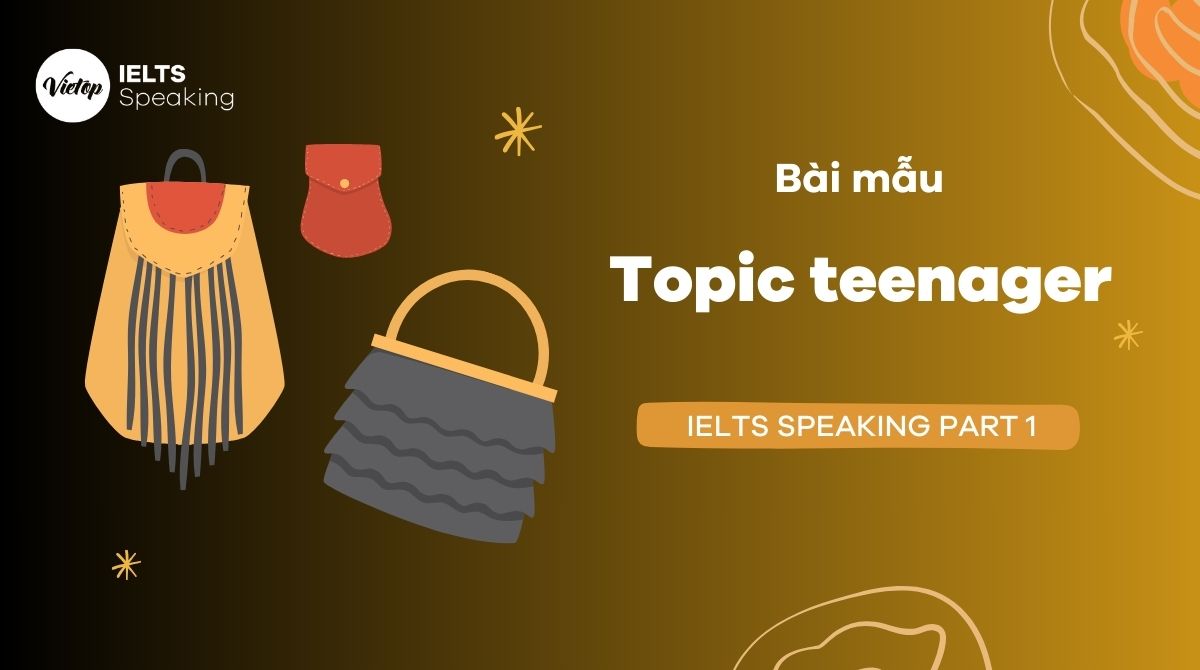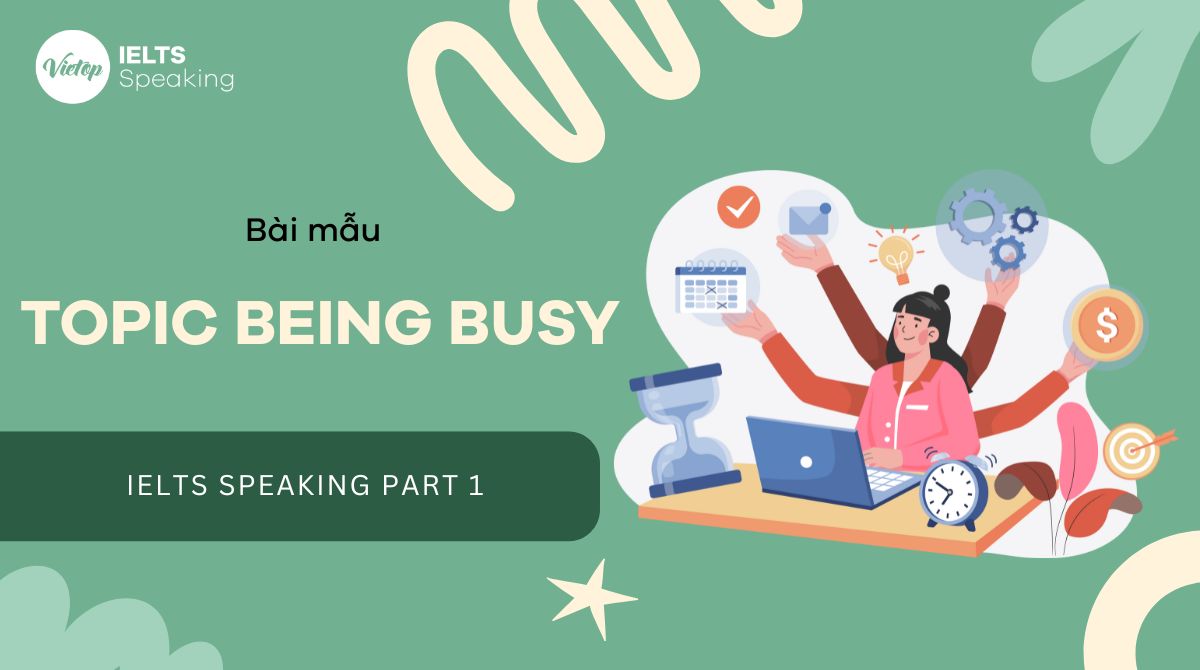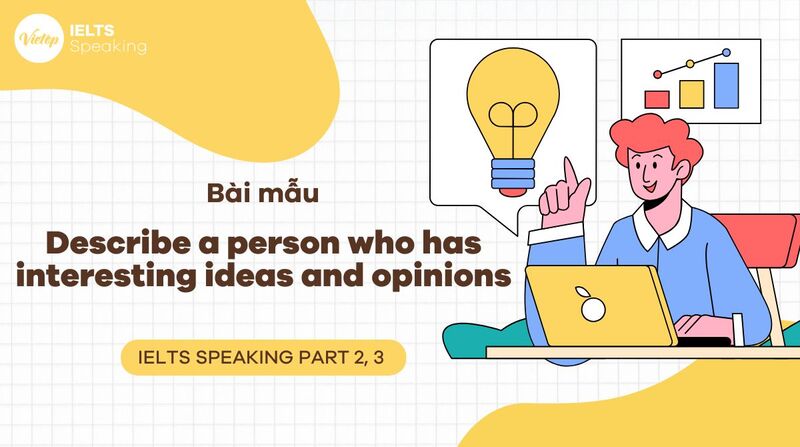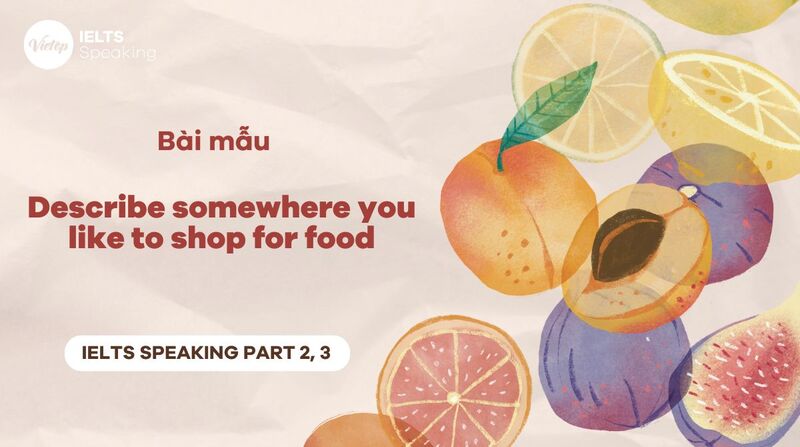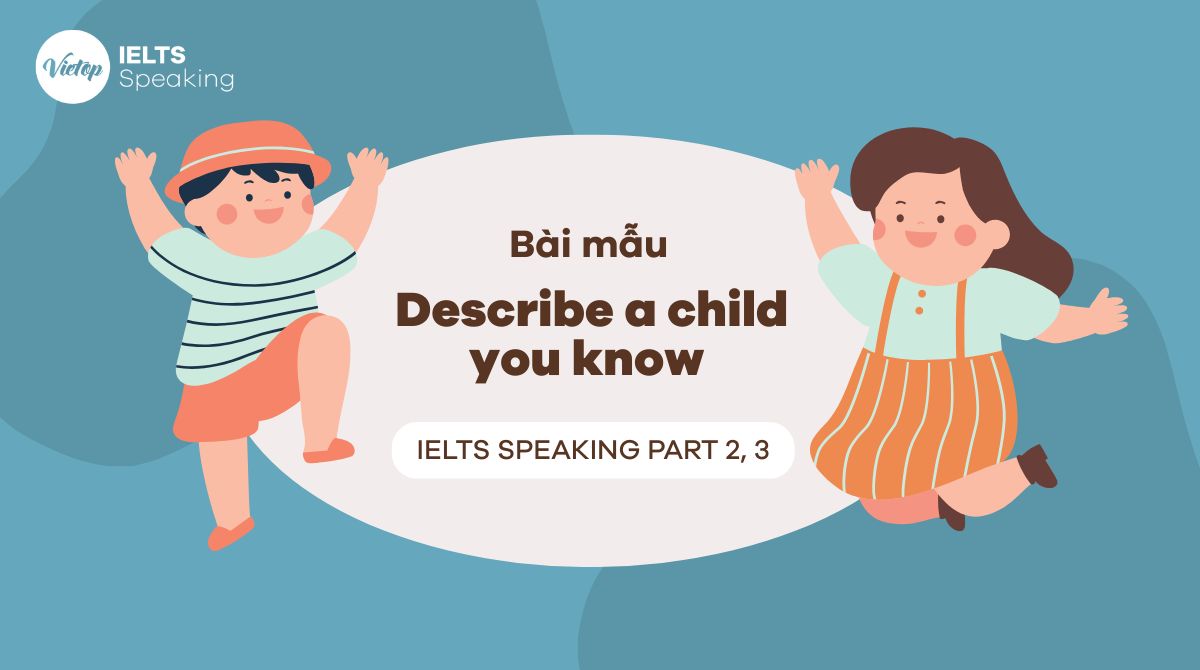Ở bài viết dưới đây, Vietop English gửi đến các bạn phần tổng hợp các bài mẫu Speaking IELTS part 1 – 2 – 3 do đội ngũ giáo viên Vietop biên soạn và tổng hợp. Số bài mẫu sẽ được cập nhật nên các bạn hãy thường xuyên theo dõi bài viết nhé!
1. Cấu trúc bài thi IELTS Speaking
Thông thường, một bài thi IELTS Speaking sẽ dài khoảng 10 – 15 phút và có cấu trúc 3 phần như sau:
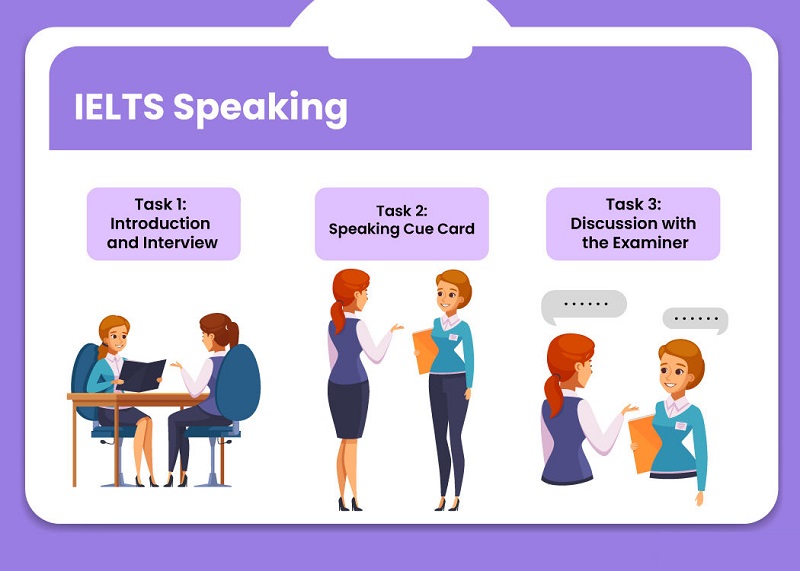
| Phần thi | Nội dung | Số câu hỏi | Kỹ năng cần thiết |
| IELTS Speaking Part 1: 4 – 5 phút | Các câu hỏi ngắn về 2 chủ đề liên quan đến bản thân, gia đình, công việc, học hành, sở thích,… | 2 hoặc 3 câu cho 1 chủ đề, và bạn nên trả lời ngắn gọn (khoảng 10 – 20 giây), đi vào trọng tâm và thêm một số chi tiết, ví dụ nhỏ. | Độ trôi chảy, tự nhiên khi nói. |
| IELTS Speaking Part 2: 3 – 4 phút | Một chủ đề quen thuộc để làm một “bài thuyết trình” 2 phút. | Bạn sẽ được giám khảo cho chủ đề (có mẫu dàn ý) và có 1 phút chuẩn bị trước khi nói 2 phút. | Độ trôi chảy, tự nhiên khi nói. Kỹ năng diễn đạt, dùng từ vựng và ngữ pháp chính xác. Quản lý được thời gian. |
| IELTS Speaking Part 3: 4 – 5 phút | Những câu hỏi liên quan đến chủ đề của Part 2, sẽ mang tính tổng quát hơn là cá nhân. | Giám khảo sẽ hỏi bạn 4 – 5 câu hỏi, vì vậy bạn sẽ cần đưa ra câu trả lời dài hơn, đi kèm giải thích và ví dụ. | Độ trôi chảy, tự nhiên khi nói. Kỹ năng diễn đạt, dùng từ vựng và ngữ pháp chính xác. Kỹ năng giải thích, đánh giá, đưa ví dụ thích hợp. |
2. Tổng quát tiêu chí chấm thi IELTS Speaking
Trong bài thi IELTS Speaking, khả năng sử dụng tiếng Anh khi nói của bạn sẽ được đánh giá qua 4 tiêu chí – ngữ pháp, từ vựng, độ trôi chảy và phát âm. Mời bạn tham khảo bài viết của Vietop bên dưới về các tiêu chí này:
- Grammatical Range and Accuracy – ngữ pháp
- Lexical Resource – từ vựng
- Fluency and Coherence – độ trôi chảy
- Pronunciation – phát âm
3. Cách ôn thi IELTS Speaking hiệu quả
Công thức A.R.E.A trong phần thi IELTS Speaking
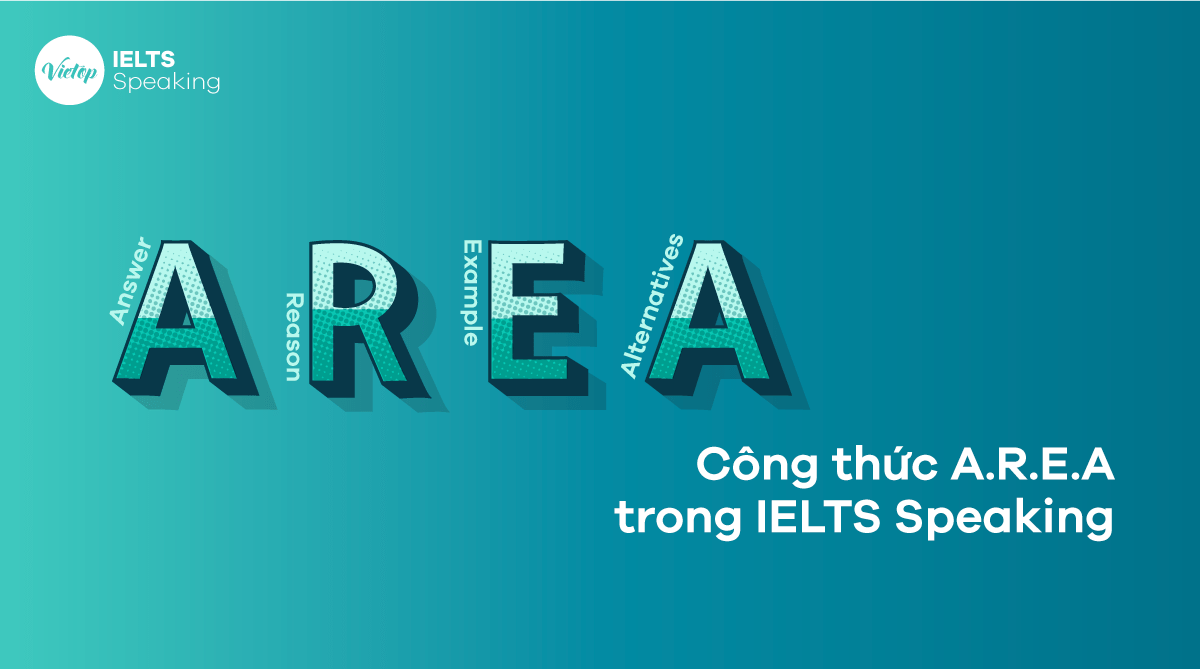
Đây là một công thức đơn giản nhưng lại khá hiệu quả, giúp bạn cải thiện điểm phần thi IELTS Speaking rất nhiều. Công thức A.R.E.A bao gồm:
- A – Answer: Đưa ra câu trả lời trực tiếp cho câu hỏi.
- R – Reason: Đưa ra lý do cho câu trả lời.
- E – Example: Đưa ra ví dụ cụ thể cho câu trả lời.
- A – Alternatives: Đưa ra ý kiến phản bác cho câu hỏi (không bắt buộc)
Ta có ví dụ về công thức này như sau:
Q: Do you like listening to music? (Bạn có thích nghe nhạc không?)
A: (Answer) Absolutely yes. I think I cannot live without music (Reason) because it helps me to relieve stress and escape from reality for a while. (Example) For example, whenever I’m in a bad mood, listening to some soothing music helps to lift up my spirit.
Mời bạn tham khảo bài viết chi tiết của Vietop về công thức A.R.E.A.
Một số lời khuyên khác
Ngoài việc ứng dụng công thức A.R.E.A, Vietop cũng gợi ý bạn một số mẹo sau để có thể thể hiện tốt hơn trong phần thi IELTS Speaking:
- Tìm hiểu kỹ về phần thi IELTS Speaking và có sự chuẩn bị cho các dạng câu hỏi thường gặp
- Học cách paraphrase và các collocations, idioms cần thiết
- Thường xuyên luyện tập để tự tin hơn và thể hiện tốt phần thi của mình
Xem thêm: Khóa học IELTS Cấp tốc – Cam kết tăng ít nhất 0.5 – 1.0 band score SAU 1 THÁNG HỌC
4. Bài mẫu Speaking IELTS theo từng Part
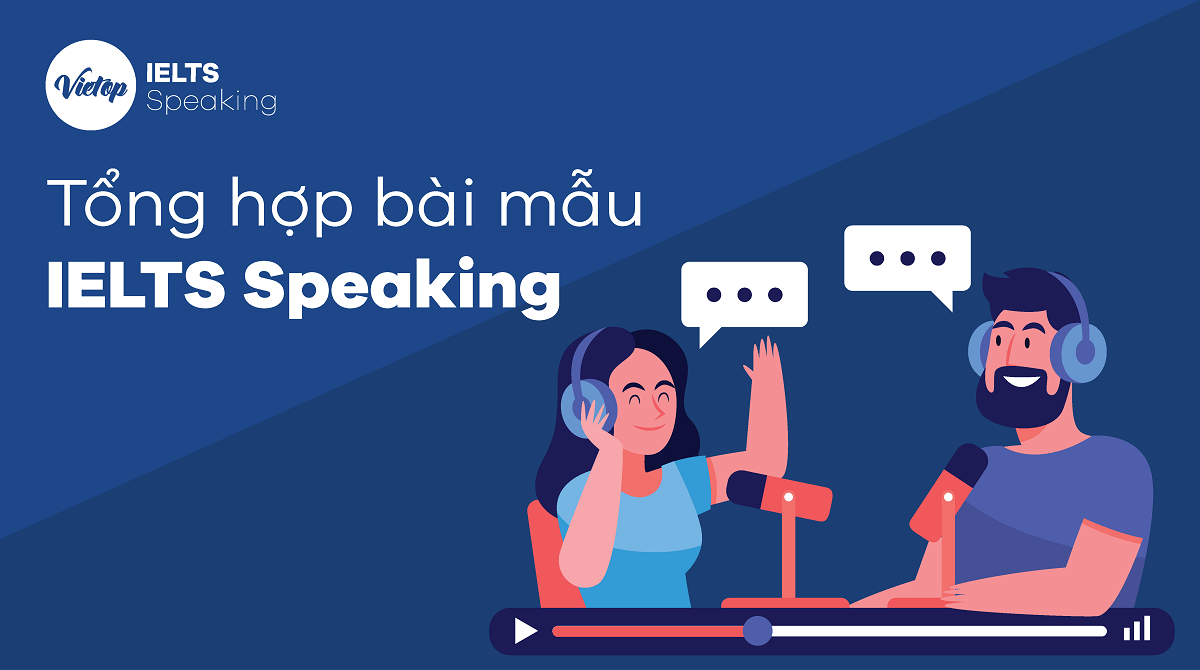
IELTS Speaking part 1
Topic Memory
- Is it easy for you to remember people’s names?
- Can you remember the names of your childhood friends?
- How would you feel if someone forgot your name?
Topic Places to read
- Where do you usually read?
- Do you prefer to read individually or as a group?
- What makes a perfect place to read?
Topic Resting
- How often do you take a rest?
- What do you usually do when you are resting?
- How do you feel after taking a nap?
Topic Picnic
- Have you ever gone to picnics?
- How frequently do you go out for picnics?
- Did you go on a picnic when you were a child?
Topic Math
- Do you like math?
- When did you start learning mathematics?
- Do you learn math in secondary schools/ high schools?
- What teachers can do to make math more interesting to students
Topic TV programs
- What kind of TV programs do you like?
- Do you often watch programs on TV or your cell phone?
- Do you like watching the same kind of program all the time?
Topic Primary school
- What did you like to do the most when you were in primary school?
- How did you go to your primary school?
- How do you like your primary school?
- What did you do in your leisure time in your primary school?
Topic Barbecue
- Do people in your country like barbecue?
- What kind of food do you like to eat for barbecue?
- Would you like to have a barbecue with your family or your friends?
- Did you have barbecue when you were a child?
Topic Singing
- Do you often sing?
- When do you like to sing?
- Is it difficult to sing well?
- Do you want to be a singer?
- What kinds of music do you like to sing?
Topic Flowers
- What kinds of flowers do you know?
- Are there any flowers that have special meanings in your country?
- Have you planted any flowers?
- Have you sent flowers to anyone?
Topic Wild animals
- Do you like to watch TV programs about wild animals?
- Did you learn something about wild animals at school?
- Where can you see wild animals?
- In which country do you think you can see many wild animals?
IELTS Speaking part 2, 3
Topic Spending Money
Part 2:
Describe an activity you enjoy doing occasionally that is a bit expensive
You should say:
- What activity it is
- When and where you do this
- Who you do it with
- Why you enjoy doing it
Part 3:
- What are the advantages and disadvantages of being rich?
- What is the difference between men and women in buying things?
- Why are some sports expensive and are they for everyone?
Topic Wild Animal
Part 2:
Describe a time when you were really close to a wild animal.
You should say
- What it looked like
- Where you saw it
- What it likes to eat or do
- Why you like it
Topic Family
Part 2:
Describe a family that is not your own that you like
You should say:
- Whose family this is
- Where they live
- Who are the family members
- Why you like this family
Part 3:
- Who do you think should be responsible for the care of the elderly, the family or the government?
- Why is the number of joint families decreasing in modern time?
- What characteristics do elder siblings often have?
- What do you think about single parent families?
Topic Hotel
Part 2:
Describe a special hotel you have stayed in. You should say:
- Where it is
- You went there
- Why you went there
- And why you think it is a special hotel.
Topic Opinion
Part 2:
Describe a time when you changed your opinion
You should say:
- what the original opinion was
- why you changed it
- when it was
- and how you felt about it.
Part 3:
- Do children like to change their opinion?
- Why do people change their opinions?
- Who do young people turn to for advice?
Topic Travel and Work
Part 2:
Describe a place you would like to visit in the future
You should say:
- where this place is
- how you know about it
- what this place looks like
- and explain why you would like to visit this place
Part 3:
- What do you think about working for a short time in another country?
- How do the young generation think about that, is it easy to make that decision?
- What kinds of jobs are easy to get in a foreign country?
Topic Photograph
Part 2:
Describe a photograph of you that you like.
You should say:
- where it was taken
- when it was taken
- who took it
- and explain why you like it.
Part 3:
- Why do people take photos?
- Why is photography important in today’s society?
- Do you think paper photos have more value than digital ones? Why?
Topic Decision
Part 2:
Describe a good decision you made recently. You should say:
- What the decision was
- When you made the decision
- How you made the decision
- And explain why you think it was a good decision.
Xem chi tiết bài mẫu và audio tại: Topic Decision: A Trip to Sapa – Bài Mẫu IELTS Speaking Part 2
Topic Music
Part 2:
Describe a singer that you like.
You should say:
- who this person is
- what type of songs he/she sings
- what type of people listen to his/her songs
- and explain why you like him/her.
Part 3:
- What kind of music do people like at different ages?
- What kind of music is popular in your country now and what kind will be in the future?
- Do parents in your country require their children to learn and to play musical instruments?
- Why do some people like to listen to live music while others prefer CDs?
Topic Advice
Part 2:
Describe a time when you gave advice to others
You should say:
- who you gave advice to
- what the situation was
- what advice you gave
- And what the result was
Part 3:
- In general, what kind of people is most suitable for giving advice to others?
- In which situation is it better to follow the advice of your friends than your parents?
- Which do you think is better, advice from young people or advice from older people?
- Why do so many young people not accept the advice of older people?
Topic Job
Part 2:
Describe an ideal job you’d like to do in the future
You should say:
- What it is.
- How you can get this job.
- What kinds of work you would do for the job.
- And explain why you want to have it.
Part 3:
- What do most people consider when finding/accepting a job?
- What is more important? Job satisfaction or a high salary?
- What kinds of jobs do people in your country prefer?
- Do you think robots will take over humans’ jobs in the future?
Topic Puzzle
Part 2:
Describe a (jigsaw, crossword, etc.) puzzle you have played
You should say:
- what it is like
- how easy or difficult it is
- how long it takes you to solve
- And how you feel about it
Part 3:
- Why do parents let their children play puzzles?
- What kinds of puzzles improve people’s intelligence?
- Why are detective stories attractive to people?
- Which do you think is better? A detective movie or its original novel?
Topic Politeness
Part 2:
Describe a polite person you know
You should say:
- Who this person is
- How you know this person
- What the person looks like
- And explain why you think this person is polite
Part 3:
- How do people show politeness in your country?
- Are people today as polite as people were in the past?
- Do you think politeness is different in different countries and parts of the world?
Topic: Famous Person
Part 2:
Describe a famous person you are interested in
You should say:
- Who this person is
- What this person was like before his/her became famous
- How you know this person
- And explain why you think this person is interesting
Part 3:
- What sorts of people are famous in your country?
- How do people become famous?
- Are there any differences between people who were famous a few years ago and the people who are famous today?
- Do you think there is such a thing as bad publicity?
Topic Journey
Part 2:
Describe a short journey that you often take but dislike
You should say:
- What it is.
- How you can get this job.
- What kinds of work you would do for the job.
- And explain why you want to have it.
- And explain why you dislike it.
Part 3:
- What kind of transportation do people in your country often use for travelling?
- Do you think that decreasing the use of transportation is a good measure to protect the environment?
- What are the differences between traveling to a city and reading about it in the book?
Topic Toys
Part 2:
Describe a toy that you liked when you were a child
You should say:
- What the toy was
- Who gave it to you
- ow you used this toy
- And explain how you felt when you got this toy
Part 3:
- What toys are popular with boys and girls in your country now?
- Do you think advertising that targets children should be banned?
- Do you see the fact that children are targeted by many companies as potential consumers spoil their childhood?
Topic Imagination
Part 2:
Describe a time you needed to use your imagination
You should say:
- What you did using imagination
- When it was
- Whether it was easy or difficult
- And explain how you felt
Part 3:
- What kind of jobs require imagination?
- What games require children to use imagination?
- Should young children use and develop imagination?
- How can teachers encourage children to use imagination?
5. Tổng hợp bài mẫu IELTS Speaking tháng 3, 4 năm 2021

Một số bài IELTS Speaking trong tháng 3, 4 được biên soạn bởi đội ngũ giảng viên của Vietop:
Describe a time when you were really close to a wild animal – IELTS Speaking part 2
Bài mẫu Describe a live sports match that you have watched – IELTS Speaking part 2
VIETOP hy vọng rằng những bài mẫu Speaking IELTS trên đây sẽ giúp ích được cho bạn trong quá trình luyện thi IELTS nói chung và quá trình luyện IELTS Speaking nói riêng!
Học thêm các kỹ năng khác:


